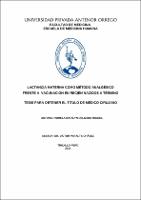Mostrar el registro sencillo del ítem
Lactancia materna como método analgésico frente a vacunación en recién nacidos a término
| dc.contributor.advisor | Peralta Chávez, Víctor | |
| dc.contributor.author | Delgado Miguel, Fiorela Marilyn | |
| dc.creator | Delgado Miguel, Fiorela Marilyn | |
| dc.date.accessioned | 2014-11-26T13:28:52Z | |
| dc.date.available | 2014-11-26T13:28:52Z | |
| dc.date.issued | 2014 | |
| dc.identifier.uri | https://hdl.handle.net/20.500.12759/531 | |
| dc.description.abstract | Comparar el dolor frente a la vacunación que perciben los recién nacidos sanos a término con lactancia materna y con lactancia artificial, del servicio de Alojamiento Conjunto del Hospital Belén de Trujillo en febrero del 2014. Material y Métodos: Se llevó a cabo un estudio tipo ensayo clínico, con dos grupos. La población de estudio estuvo constituida por 82 recién nacidos sanos a término según los criterios de inclusión y exclusión establecidos del Servicio de Alojamiento Conjunto del Hospital Belén de Trujillo en febrero del 2014. Resultados: El 19.5% de recién nacidos con lactancia materna presentaron dolor mínimo durante la vacunación. El 34.1% de recién nacidos con lactancia artificial presentaron dolor muy severo durante la vacunación. No existe diferencia estadísticamente significativa del dolor percibido durante la vacunación entre recién nacidos varones y mujeres. Conclusión: El 26.8% de los recién nacidos a término que recibían lactancia materna presentaron dolor severo o muy severo en la vacunación frente a un 73.2% de recién nacidos a término con lactancia artificial. | es_PE |
| dc.description.abstract | Compare the pain at vaccination between the term newborns with breastfeeding and with artificial feeding, of the Accommodation Unit from the Hospital Belen of Trujillo in February 2014. Material and Methods: The actual study is a two groups trial. The population was integrated by 82 newborns according to inclusion and exclusion criteria established, all of them were of the Accommodation Unit from The Hospital Belen of Trujillo in February 2014. Results: 19% of the newborn with breastfeeding presented the lowest pain during vaccination. 34.1% of the newborn with artificial feeding had the highest pain during the vaccination. Doesn´t exist a significant difference between the pain during vaccination of the boys newborn and the females newborn. Conclusion: 26.8% of the newborn with breastfeeding had severe or very severe pain during vaccination in compare with 73.2% of the newborn with artificial feeding. | en_US |
| dc.description.uri | Tesis | es_PE |
| dc.format | application/pdf | es_PE |
| dc.language.iso | spa | es_PE |
| dc.publisher | Universidad Privada Antenor Orrego - UPAO | es_PE |
| dc.rights | info:eu-repo/semantics/openAccess | es_PE |
| dc.source | Universidad Privada Antenor Orrego - UPAO | es_PE |
| dc.source | Repositorio institucional - UPAO | es_PE |
| dc.subject | Método analgésico | es_PE |
| dc.subject | Recién nacido | es_PE |
| dc.title | Lactancia materna como método analgésico frente a vacunación en recién nacidos a término | es_PE |
| dc.type | info:eu-repo/semantics/bacherlorThesis | es_PE |
| thesis.degree.level | Titulo Profesional | es_PE |
| thesis.degree.grantor | Universidad Privada Antenor Orrego. Facultad de Medicina Humana | es_PE |
| thesis.degree.name | Medico Cirujano | es_PE |
| thesis.degree.discipline | Medicina | es_PE |
Ficheros en el ítem
Este ítem aparece en la(s) siguiente(s) colección(es)
-
Medicina Humana [2717]

